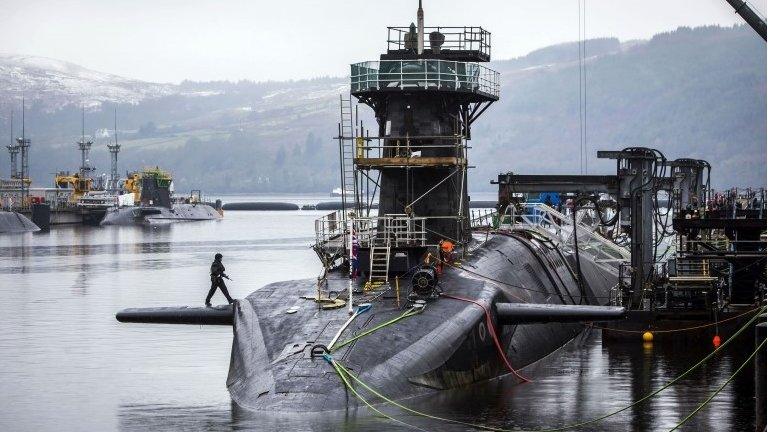Theresa May: It would be irresponsible to scrap Trident
- Published
- comments
Trident vote: Theresa May and Jeremy Corbyn in Commons
Theresa May has told MPs it would be "an act of gross irresponsibility" for the UK to abandon its nuclear weapons.
The prime minister accused critics of the Trident system of being "the first to defend the country's enemies".
MPs will vote later on whether to renew the UK's nuclear weapons programme.
Labour leader Jeremy Corbyn, who will vote against the government but whose party is split, warned of the effect that using an "indiscriminate weapon of mass destruction" could have.
But he faced repeated criticism from his own backbenchers who told him to state Labour's official policy, which is in favour of renewal.
Labour is currently reviewing its stance on Trident, and its MPs have been given a free vote in the Commons debate.
The SNP will oppose the government, but ministers are expected to win the vote.
MPs will be asked whether to press ahead with the manufacture of the next generation of nuclear submarines, set to be built at the BAE shipyard in Barrow.
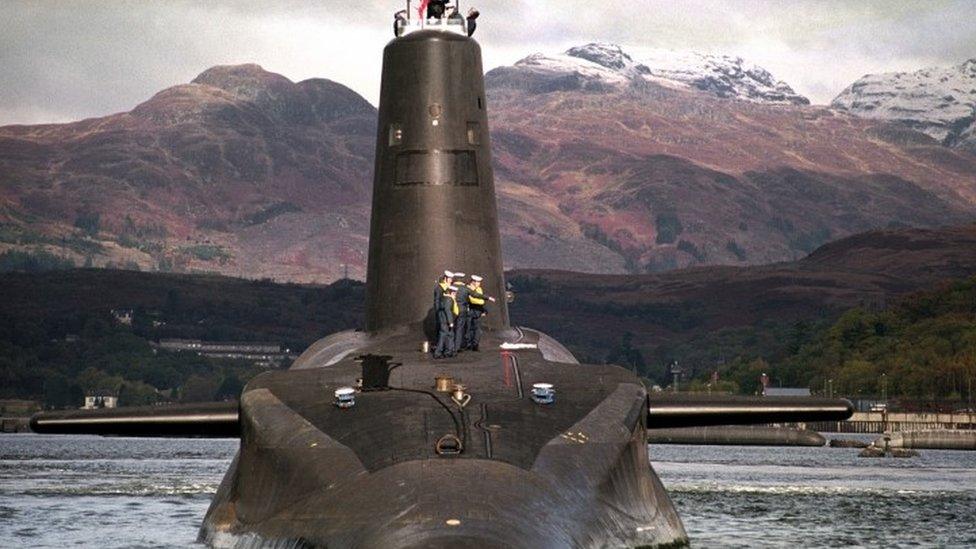
If approved, the successor submarines could be in service by the end of the next decade
Mrs May warned of the threat faced by the UK, saying: "We cannot afford to relax our guard."
The nuclear threat, she said, had "not gone away, if anything it has increased".
She said it would be irresponsible to discard the "ultimate insurance policy".
Green Party MP Caroline Lucas said Trident was "driving proliferation, not preventing it", prompting the PM to accuse her and other critics of defending the UK's enemies.
Stopping nuclear weapons being used, the PM said, was "not achieved by giving them up unilaterally".

What is Trident for?
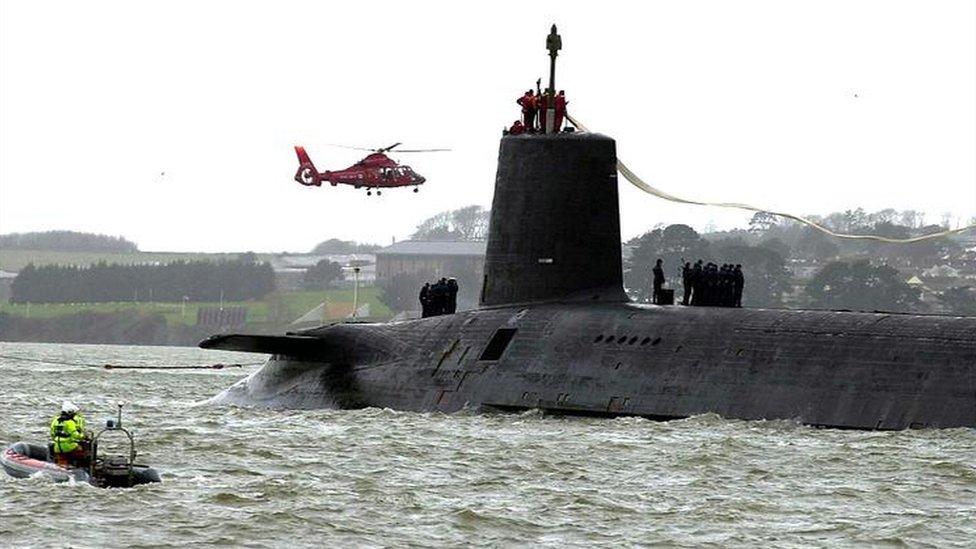
The Royal Navy's nuclear submarine HMS Vanguard is 150 metres long
Since 1969, according to government documents, external, a British submarine carrying nuclear weapons has always been on patrol, gliding silently beneath the waves, somewhere in the world's oceans.
The logic is to deter a nuclear attack on the UK because, even if the nation's conventional defence capabilities were destroyed, the silent submarine would still be able to launch a catastrophic retaliatory strike on the aggressor, a concept known as mutually assured destruction.
The submarines, based at Faslane on the River Clyde, carry up to eight Trident missiles; each can be fitted with a number of warheads.
Read more about the history of the UK's nuclear weapons system

Responding for Labour, Mr Corbyn - a life-long opponent of nuclear weapons - saying the UK should "step up to the plate" on disarmament.
He said the cost of renewal - currently £31bn - was "ballooning ever upwards".
"We on these benches, despite our differences on some issues, have always argued for the aim of a nuclear-free world," he said.
But he asked MPs to "pause" to consider the "catastrophic" effects of the use of nuclear weapons.
They had not stopped so-called Islamic State or former Iraqi leader Saddam Hussein, he said.
SNP Westminster leader Angus Robertson said Trident "was an immoral, obscene and redundant weapons system", saying the vote was "one of the most important this parliament will ever take".
Labour, he said, were "facing three ways at the same time and letting the government get away with this".
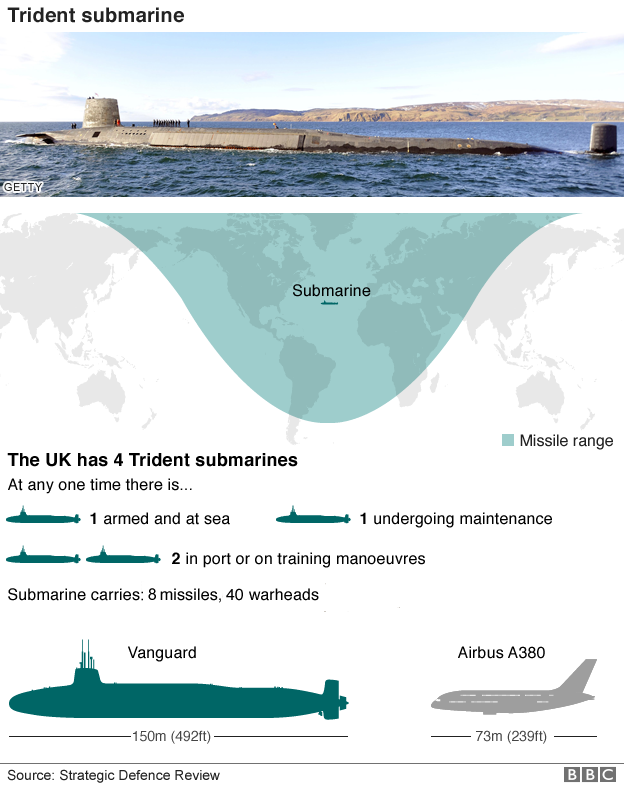
Mr Corbyn is at odds with many of his Labour MPs over the future of the UK nuclear weapons system and has commissioned a review led by shadow foreign secretary Emily Thornberry to look at its future.
Earlier shadow chancellor John McDonnell urged Labour MPs to "respect each other's views".
Labour deputy leader Tom Watson told the BBC he would vote in favour of renewal, saying he thought it was "unacceptable" for MPs to abstain.
"Now the government have made us take another vote on this, you cannot absolve yourself of responsibility for making a decision," he said.
'Playing games'
He also warned that to oppose Trident would threaten security and cost jobs.
Ms Thornberry told BBC Radio 4's Today programme that she will abstain from the vote "because frankly the Tory government is playing games with us".
"It will make no difference to what the government does, the government is proceeding with it in any event," she said.
"This vote, in the last week of Parliament, is all about playing games with the Labour Party and trying to embarrass us."
But Defence Secretary Michael Fallon denied the vote was politically-motivated, saying the government was seeking Parliament's backing so it could get on with the renewal project and give confidence to the supply chain.
The estimated cost has risen in recent years, but Mr Fallon said a new delivery body would ensure the submarines were delivered "on time and on budget", saying the £31bn bill had to be against their 30-year lifespan.
Labour leadership hopeful Owen Smith, a former member of the Campaign for Nuclear Disarmament (CND), said he would back renewal, saying he believed the world had become "more volatile, more insecure over the last few years".
- Published23 May 2017
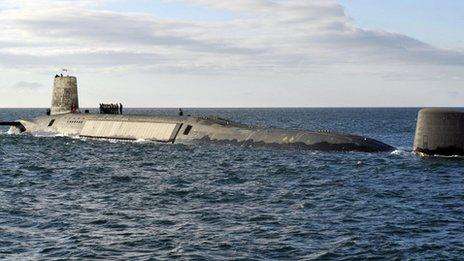
- Published17 July 2016
